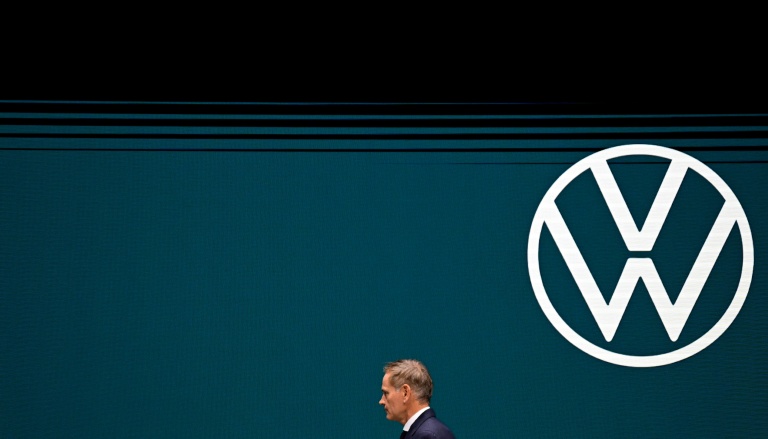Top Stories
Volkswagen Faces €1 Billion Loss Amid Tariffs and Porsche Struggles

Volkswagen has reported a significant quarterly loss of €1.07 billion ($1.24 billion) for the period from July to September 2023, marking the first loss for the German automotive giant in five years. This downturn is attributed to ongoing challenges related to tariffs imposed by the United States and difficulties faced by its subsidiary, Porsche, as it transitions to electric vehicles.
This loss is the first that Europe’s largest automaker has experienced since the second quarter of 2020, when it was impacted by the COVID-19 pandemic. Volkswagen’s finance chief, Arno Antlitz, highlighted the financial strain caused by US tariffs, estimating the annual cost at approximately €5 billion. He stated, “The result is much weaker compared to the same period last year. Higher tariffs, adjusting the product strategy at Porsche, and write-downs to Porsche’s value cost €7.5 billion.”
Porsche’s Challenges and Market Pressures
Porsche, once considered the crown jewel of Volkswagen, is now a source of concern for the group. The brand has struggled with fierce competition from local manufacturers in China and a decline in demand for electric sports cars, which have not resonated with consumers accustomed to traditional petrol engines. In September, Volkswagen warned of an expected €5.1 billion hit to its core profits for the year due to Porsche’s revised profit targets and its decision to prolong the sale of petrol vehicles.
The company has also been negatively impacted by tariffs on car exports from the European Union. Under a deal announced in late July 2023, a 15 percent tariff applies to EU car exports to the US, down from a previous 27.5 percent, but still significantly higher than the 2.5 percent rate that was in place prior to former President Donald Trump‘s trade policies.
Antlitz noted that despite the net loss, Volkswagen’s revenues rose by 2.3 percent to €80.3 billion, aided by a slight increase in global vehicle sales. He acknowledged the ongoing burden of tariffs, stating, “It is not really appropriate to exclude it from the calculation.”
Restructuring and Leadership Changes
Even before the tariff situation escalated, Volkswagen was dealing with internal challenges. In December 2022, the company reached an agreement with unions to eliminate 35,000 jobs by 2030, primarily affecting its flagship brand. Additionally, both Audi and Porsche have announced significant job cuts in recent months. In a letter to employees, Porsche acknowledged the need for further cost reductions, admitting that its current business model “no longer works in its current form.”
To navigate these challenges, Porsche appointed Michael Leiters as its new CEO, effective January 1, 2026. Leiters, who previously led McLaren, will take over from Oliver Blume, who currently serves as both Porsche’s and Volkswagen Group’s chief executive. This dual role has faced criticism from some unions and investors who question the effectiveness of having a single leader oversee both entities during a time of crisis.
As Volkswagen continues to confront these setbacks, the broader implications for the German automotive industry remain significant. The company’s plight reflects not only its specific challenges but also the difficulties faced by traditional manufacturers in adapting to an increasingly competitive and rapidly changing market landscape.
-

 Science2 months ago
Science2 months agoToyoake City Proposes Daily Two-Hour Smartphone Use Limit
-

 Health2 months ago
Health2 months agoB.C. Review Reveals Urgent Need for Rare-Disease Drug Reforms
-

 Top Stories2 months ago
Top Stories2 months agoPedestrian Fatally Injured in Esquimalt Collision on August 14
-

 Technology2 months ago
Technology2 months agoDark Adventure Game “Bye Sweet Carole” Set for October Release
-

 World2 months ago
World2 months agoJimmy Lai’s Defense Challenges Charges Under National Security Law
-

 Technology2 months ago
Technology2 months agoKonami Revives Iconic Metal Gear Solid Delta Ahead of Release
-

 Technology2 months ago
Technology2 months agoSnapmaker U1 Color 3D Printer Redefines Speed and Sustainability
-

 Technology2 months ago
Technology2 months agoAION Folding Knife: Redefining EDC Design with Premium Materials
-

 Technology2 months ago
Technology2 months agoSolve Today’s Wordle Challenge: Hints and Answer for August 19
-

 Business2 months ago
Business2 months agoGordon Murray Automotive Unveils S1 LM and Le Mans GTR at Monterey
-

 Lifestyle2 months ago
Lifestyle2 months agoVictoria’s Pop-Up Shop Shines Light on B.C.’s Wolf Cull
-

 Technology2 months ago
Technology2 months agoApple Expands Self-Service Repair Program to Canada









